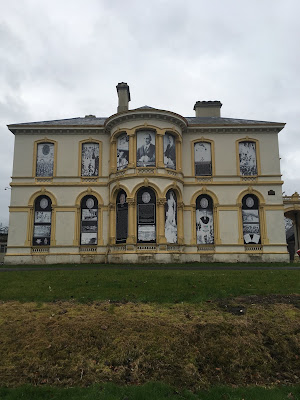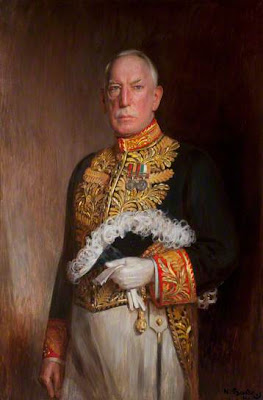JAMES CRAIG was born near Strandtown on the outskirts of east Belfast, the sixth son of James Craig (1828–1900), a prosperous distiller.
The Craig family came to Ulster in 1608 and lived at Ballyvester, near Donaghadee; and, at a later time, at Ballyvester House.
Craig entered the firm of Dunville & Company, whiskey distillers, as a clerk, aged 40.
He subsequently became a millionaire and partner in the firm.
His career is already well documented on the Internet.
The Craigavon Papers are held at the Public Record Office of Northern Ireland.
The supporters of the Craigavon coat-of-arms depict a constable of the Ulster Special constabulary, his hands resting on a rifle, on the left; and a private soldier of the Royal Ulster Rifles, armed and accoutred, to the right.
The titles are currently held by the 3rd Viscount, born in 1940.
CRAIGAVON HOUSE, Strandtown, Belfast, was the seat of the Craig family.
Its main entrance was on the Holywood Road, close to where the Mormon church is today.
The grounds extended to twenty acres.
 |
| Illustration: National Library of Ireland |
Craigavon House was built in 1870.
It is a two-storey Victorian dwelling with a front of two bays on either side of a central bow.
 |
| Entrance Front in 2019 |
There are round-headed windows in the lower storey, with camber-headed windows above.
A pavilion with pedimented portico forms the entrance front of the house, joined to the main block by an orangery.
 |
| The Pavilion in 2019 |
The Craigavon crest, a lion rampant, adorns the front of the orangery in the form of carved stone-work.
There were two gate lodges, one on the Holywood Road where William Cowan, a gardener, lived ca 1900, since demolished; and the other on Circular Road, home to James Clements, coachman.
From Holywood Road the drive ran parallel to the Circular Road, on a steep incline.
 |
| North Front in 2019 |
The Circular Road lodge is in good condition.
The Craigs' closest neighbours would have been the Mitchells at Marmont House.
Of the big houses on Circular Road, only Craigavon and Marmont (Mitchell House School) remain.
CRIGAVON HOUSE is owned and run by the Somme Association, a charity which cares for elderly war veterans.
Sadly, the future of Craigavon House remains uncertain.
Sir Edward Carson declared the Ulster Solemn League and Covenant from its steps.
 |
| East Front in 2019 |
It was later signed by more than 47,000 men and women on 28 September, 1912, who pledged themselves to defend the Protestant heritage in the province.
Residents of the Somme Hospital, a nursing home for veterans, moved out of the main building to a new block some time ago, but an historical society which occupies the rear of the building, is now moving into the house itself.
The Somme association hopes to attract other tenants which would help with running costs of the building, because they are reluctant to sell it.
The Craigs also owned TYRELLA HOUSE, between Ardglass and Newcastle, County Down, which was bought by the 1st Viscount's father.
In the study of Tyrella there is a stained-glass window with the Craig crest.
The architect Vincent Craig was a brother of the 1st Viscount.
He designed The Royal Ulster Yacht Club.
Another brother, Charles Craig, was also a politician.
The architect Vincent Craig was a brother of the 1st Viscount.
He designed The Royal Ulster Yacht Club.
Another brother, Charles Craig, was also a politician.
Tyrella House was sold to the present family in 1949.
I think the last member of the Craig family to live there was Clarence, another brother of the 1st Viscount (who had seven brothers and one sister).
The early 19th century house, with a conservatory, is placed near the sea.
Lewis describes the site in 1837 as ‘… a richly planted demesne of 200 acres …’
Lewis describes the site in 1837 as ‘… a richly planted demesne of 200 acres …’
The house is protected by mature shelter trees.
There is a folly fort on a hill top to the north- east of the house.
There is a folly fort on a hill top to the north- east of the house.
An early 20th century Japanese garden to the south of the house has ‘Spider Lodge’, a summer- house; a Japanese summer-house; overgrown rockeries; water features and exotic planting.
This area fell into decline after the 2nd World War.
This area fell into decline after the 2nd World War.
The walled garden is cultivated round a house, built there in 1987.
There are glasshouses and a potting shed.
Other noted features are the entrance gates and screen pre-1835; gate lodge pre-1835; a smithy, which looks like a gate lodge.
There are glasshouses and a potting shed.
Other noted features are the entrance gates and screen pre-1835; gate lodge pre-1835; a smithy, which looks like a gate lodge.
The 1st Viscount is buried at the Stormont Estate.
The 3rd Viscount died in 2025, so the titles expire.
First published in May, 2010.








7 comments :
You would very much enjoy St. John Ervine's account of Craigavon's life, particularly the early years in 'Craigavon - Ulsterman.'
W.
Fascinating stuff as always. Aside from the St John Ervine book there is also the Patrick Buckland study of Craig as part of the Gill's Irish Lives series of the early Eighties. Also recommended. Keep up the good work Lord Belmont.
A question, do you know which family member lived in Tyrella house around the period 1910 - 1917 , was it James Craig - who we think it might have been - or Clarence ?.
Possibly more than 47,000 signed the Covenant, Time?
Tyrella House was owned by my grandfather William (Billy) Neill
http://neillorguk.weebly.com/a-history-neills-of-bangor/part-four-from-the-roots-of-the-tree-to-its-branches
Until 1928, William, 'Billy', Neill farmed Tyrella, a further instalment in a life that had included outstanding rugby talents displayed before the war for Coleraine Inst. and Ulster Schools, and after, as captain of North of Ireland, while in the intervening conflict he had been commissioned in the King's Own Royal Lancashire Regiment. Rising to the rank of Captain, he was wounded three times on the Western Front. Owing to the adverse business conditions in the late 1920s, William Neill was obliged to give up his farming activities to go to Belfast and look after the Kingsberry firm
Submitted by: Guthrie C Barrett gc_barrett@outlook.com
I used to stay with my uncle and aunt, the Warmans in Ballykinler. We loved Tyrella Beach, (when there was no firing!).
Back in the 1970s/very early eighties I was friends with a lady who lived in a cottage situated next to the Walled garden at Craigavon house. She was quite elderly even then and was gone within a few years (I think she suffered heart problems) I got the impression her family worked there and she inherited the cottage. It had no mod cons but was very quaint. As I got older we lost touch and the cottage was demolished to build the new Parkway. Always wondered about her. Does anyone have any information. I’m at cbest71@googlemail.com
Post a Comment